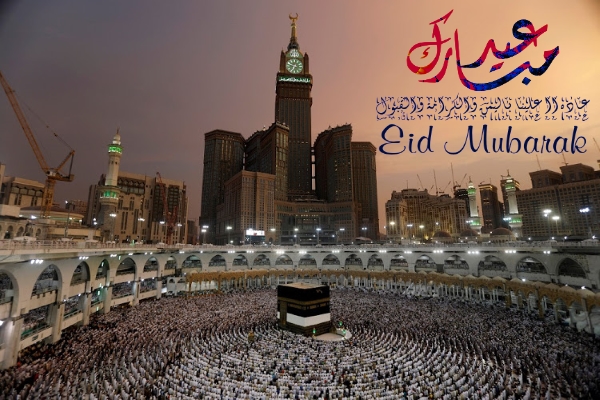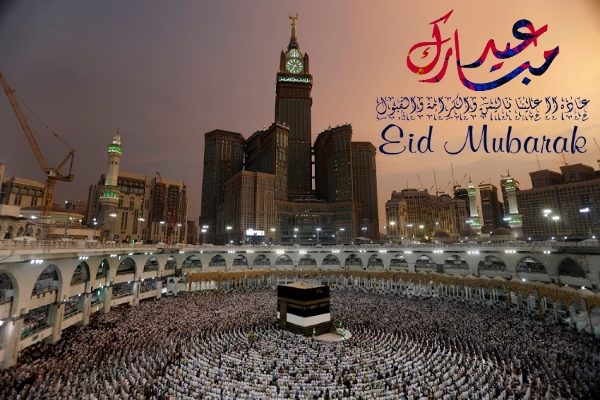
Muslims pray at the Grand mosque ahead of the annual Haj pilgrimage in Mecca, Saudi Arabia, August 29, 2017. REUTERS/Suhaib Salem TPX IMAGES OF THE DAY

By: MuslimVillage
Source: MuslimVillage
“Say, ‘Indeed, my Lord has guided me to a straight path – a correct religion – the way of Abraham, inclining toward truth. And he was not among those who associated others with Allah.’
Say, ‘Indeed, my prayer, my rites of sacrifice, my living and my dying are for Allah, Lord of the worlds.
No partner has He. And this I have been commanded, and I am the first [among you] of the Muslims.’…” (Quran 6:161-163)
On this occasion of the Greater Eid or Eid al Adha we not only celebrate but we contemplate the great sacrifice of sayyiduna Muhammad’s (ﷺ) illustrious ancestor, Ibrahim (ﷺ).
In these times of upheaval, disasters both natural and otherwise, and adversity it is worth keeping in mind, even for those of us who enjoy the comfort to properly celebrate our Eid, that this celebration is really about the morality and ethics of this Deen.
It is about the spirit of sacrifice that is at the core of tawhid or monotheism. And that spirit of sacrifice, embodied in the willingness of both sayyiduna Ibrahim (ﷺ) and his son (ﷺ) to follow a dream that demanded of them the ultimate price, is about the willingness to give all for Allah alone.
The comforts and pleasures that so many of the Ummah today have been deprived of and so many others enjoy can really distract us from that monumental message of sacrifice. It is really a message of love. Because he who cannot sacrifice cannot love. Hence Qurban and Qurbani, terms for the sacrifice, literally mean closeness/intimacy. This is why sayyiduna Ibrahim (ﷺ) is known as a Khalilullah (the intimate friend of Allah) and sayyiduna Muhammd (ﷺ) is known as Habibullah (the Beloved of Allah) – because they give their all for their Lord and would stop at nothing for His pleasure. That is true love before which anything else called love pales in comparison!
And that uncompromising love, without condition, is the way of all the Prophets and righteous of mankind and that is the eternal message and significance of both the Hajj and the Eid al Kabir, this Greater Eid, this festival of sacrifice.
Therefore, even as we celebrate let us be grateful for our blessings and let us reflect on whether we want to live for those blessings of for the One who gave them to us. Let us ask ourselves, “Am I really living such a life of unconditional love? What would I be willing to sacrifice and what would I allow to get between me and my Lord?” And if our lives must change for those answers to come then let us make a commitment to do so. Because the comforts of this life – youth, wealth, health, vitality, progeny – they come and then all go away forever, whereas living for the love of the All-Compassionate yields bliss that is quite literally eternal.
We ask Allah for that bliss and for the lives of faith, conviction, and right action that lead to it as we were shown in the example of our master Muhammad (ﷺ) and his illustrious grandfather Ibrahim (ﷺ). Eid Mubarak from the MuslimVillage team!
اللَّهُ أَكْبَرُ اللَّهُ أَكْبَرُ لَا إلَهَ إلَّا اللَّهُ. وَاَللَّهُ أَكْبَرُ اللَّهُ أَكْبَرُ وَلِلَّهِ الْحَمْدُ
Transliteration: Allahu Akbar, Allahu Akbar, La ilaha illa Llahu.
Wa Llahu Akbar, Allahu Akbar wa lillahi Lhamd.
Translation: Allah is the greatest, Allah is the greatest, there is no god but Allah.
And Allah is the greatest, Allah is the greatest and to Allah belongs all praise.



